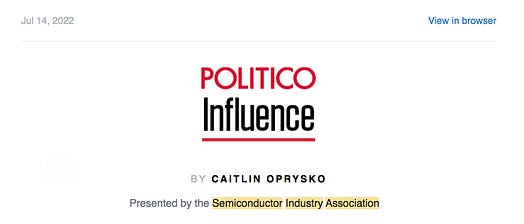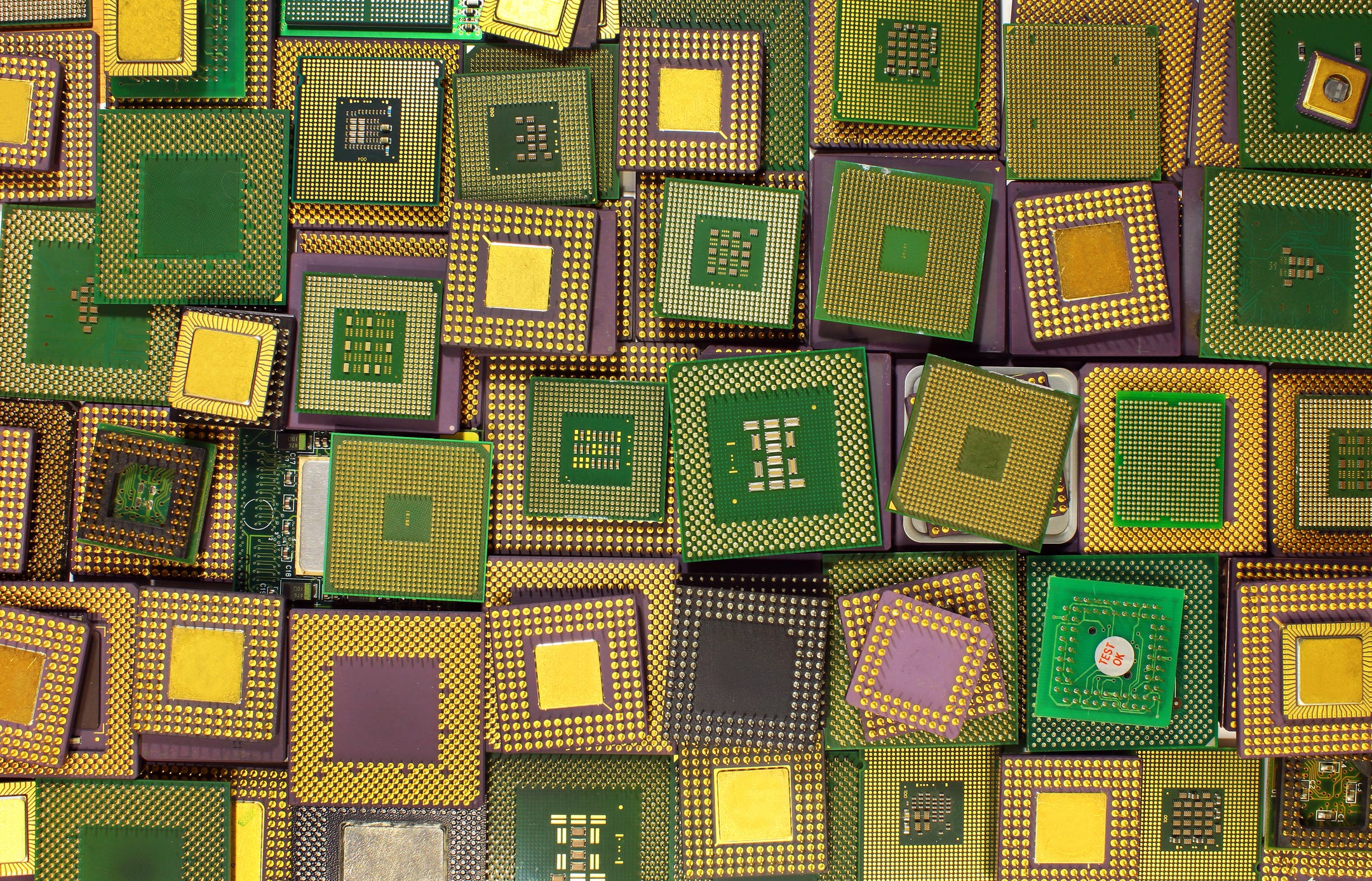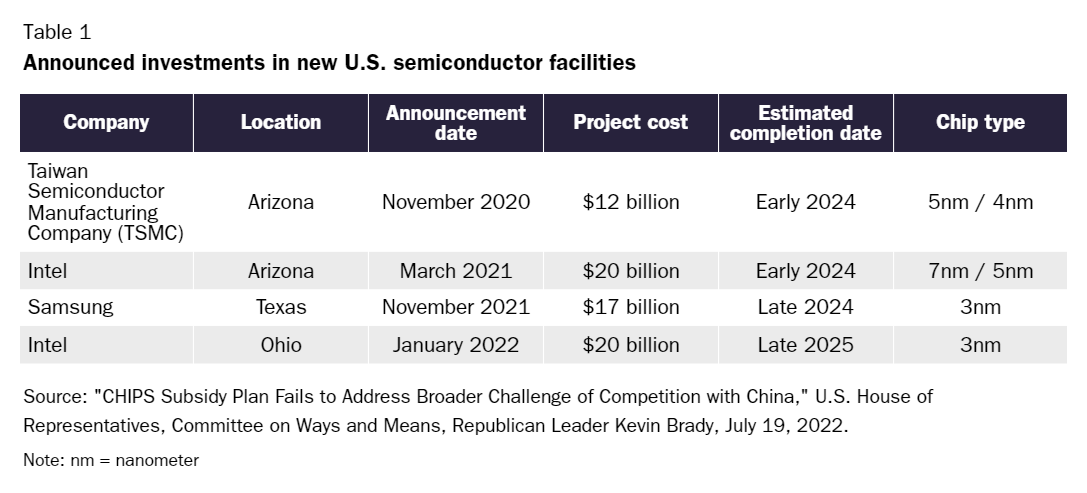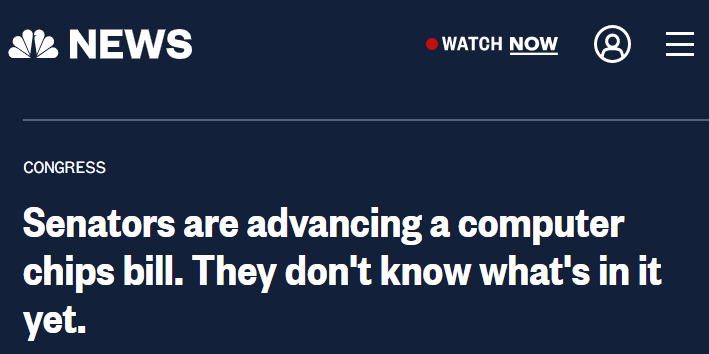Popular Information - Congress pushes in its CHIPS
Today's edition of Popular Information scrutinizes a massive lobbying campaign to convince Congress to hand over $75 billion of taxpayer money to a highly profitable industry. Other political newsletters are sponsored by the corporate trade association leading this campaign: We give you the truth. They give you To maintain our independence, Popular Information has never accepted a dime from any advertiser. But that means our existence is completely dependent on paid subscribers. You can support accountability journalism — and help us do more of it — for $6/month or $50/year. Millions of children are living in poverty, the planet is warming, and inflation is reaching new heights. Now, a bipartisan coalition in Congress has come together — to push for $76 billion in subsidies to the highly-profitable domestic computer chip industry. Yesterday, the Senate voted to advance the CHIPS Act by a 64-34 vote. Those voting in favor included 49 Democrats and 15 Republicans. Senator Bernie Sanders (I-VT) and 33 Republicans were opposed. The bill includes a combination of grants and tax credits for chip manufacturers designed to encourage domestic production. The money would subsidize the creation of new plants, known as fabs, and the retooling of existing facilities. The corporations expected to benefit the most are Intel, Texas Instruments, Micron Technology, Global Foundries, and Samsung. The legislation is intended to address a very real problem that emerged during the pandemic — an acute shortage of chips. That shortage drove up costs for goods that rely on chips, such as cars, and impeded economic growth. But even the most adamant supporters of the CHIPS Act concede that the legislation would not help address the current shortage. Fabs take multiple years to construct. Meanwhile, the shortage is already easing and some analysts are predicting that supply will outstrip demand "in the second half of 2022 or 2023." Another rationale for the legislation is that about 90% of the production of the most advanced chips are concentrated in Taiwan. This, according to some, is a national security threat because Taiwan could someday be invaded by China. If that occured, the United States could lose access to the most advanced chips. But potential instability in Taiwan isn't just a national security problem. It is also an economic risk that chip manufacturers have to address. The United States is a large consumer market that chip manufacturers need to reach. Manufacturing within the United States is attractive because it provides a consistent way to supply a large market irrespective of political instability in Taiwan or any other region. So while other countries are providing subsidies to chip manufacturers, that doesn't mean that the industry will abandon manufacturing in the United States. That's why, even in the absence of federal subsidies, several manufacturers have begun construction on fabs for advanced chips in the United States. This chart of fabs currently under construction was compiled by the CATO Institute: The three nanometers chip type represents the most advanced chips currently being produced. Will $76 billion in subsidies incentivize these companies to build new fabs? Or will this money simply be a windfall for companies that are already expanding their capacity in the United States? Intel, the loudest proponent of the CHIPS Act, has the resources to invest in new plants. In 2021, Intel collected $20 billion in profits. Its CEO, Pat Gelsinger, received a compensation package worth $176 million. Since the start of the pandemic, it has spent $16.6 billion on stock buybacks — a strategy that rewards stockholders by boosting share prices.  Now Intel is demanding taxpayer subsidies with few strings attached. While the American public is expected to provide Intel with billions of dollars, the profits that those facilities generate will go only to the company and its stockholders. Intel's sloppy publicity stuntIntel is using its new Ohio facility, announced in January, to pressure Congress to approve the CHIPS Act. In June, Intel announced that it was delaying the groundbreaking in Ohio because Congress had failed to approve the bill:
"The idea of delaying ... this sucks... I am not a delay guy," Gelsinger said on CNBC on July 6. He pleaded with Congress to pass the CHIPS Act "before August." Last week, Gelsinger issued a demand to Congress: "[D]o not go home for August recess until you have passed the Chips Act because I and others in the industry will make investment decisions." Gelsinger failed to mention that $2 billion in economic incentives had already been approved for the plant by the state of Ohio. This includes a "$600 million an onshoring grant that is intended to offset Intel's cost of building the plants in America where costs can be 20% to 30% higher than in Asia," and "$650 million over 30 years in income tax incentives based on the number of workers Intel hires." The city of New Albany is also offering a "30-year, 100% property tax abatement on the buildings that Intel constructs in the city's business park." Further, the announcement of a delay appears to be just a publicity stunt. The only thing that was delayed was the groundbreaking ceremony. Construction has already started. An Intel spokesperson told The Register that "the start date for construction had not changed." The massive lobbying campaignCongress can't agree on anything. How did two-thirds of the Senate coalesce around a plan to provide billions in subsidies to the computer chip industry? One factor was a massive corporate lobbying campaign. According to a review of federal lobbying disclosures by Popular Information, the five chip manufacturers poised to benefit most from the CHIPS Act and the trade association that represents them, the Semiconductor Industry Association (SIA), spent $34.8 million on lobbying since 2020. This includes massive expenditures by Intel ($10.9 million), Texas Instruments ($3.4 million), Micron Technology ($4.1 million), Global Foundries ($3.5 million), and Samsung ($9.5 million). SIA chipped in $3.4 million. Virtually every lobbying filing since 2020 specifically mentions the CHIPS Act as a focus. Notably, some of the companies that are lobbying for taxpayer money are not American companies. Samsung is a South Korean company. Global Foundries is majority owned by the sovereign wealth fund of the UAE. The key Senators pushing the CHIPS Act are Chuck Schumer (D-NY) and John Cornyn (R-TX). Intel has hired Klein/Johnson, a lobbying firm that was established in 2020 by a former Schumer aide (Israel Klein) and a former Cornyn aide (Matthew Johnson). Intel is currently paying Klein/Johnson $50,000 every three months. Although the bill is touted as a way to counter the influence of China, Intel and SIA are lobbying to make it easier for corporations to take the money without impacting their international business. According to reports, "Intel and its peers have been pressing lawmakers to not constrain their business in China." Intel and others want the ability to expand the production of chips in China even as they collect billions to increase domestic manufacturing. The Senate moved the bill forward even with these key issues unresolved. The U.S. Chamber of Commerce, a major lobbying force that represents nearly every large American corporation, has also thrown its weight behind the bill. When money is no objectWhen he was negotiating a reconciliation bill to address climate change, improve health care, and support working families, Senator Joe Manchin (D-WV) insisted that the bill generate twice as much revenue as it spent. That was imperative, Manchin said, to reduce the deficit. He eventually pulled the plug anyway, citing inflation. So how is Congress paying for $76 billion in subsidies to the computer chip industry? It's not. "Asked about the cost of the bill and whether it needed to be offset by cuts elsewhere… McConnell said he viewed the spending as important to national security," the Wall Street Journal reported. Nevertheless, Manchin voted on Tuesday to advance the CHIPS Act. |
Older messages
Sound off
Wednesday, July 20, 2022
In the last month, Popular Information exposed the hypocrisy of Match and other corporations that claimed to support abortion rights while makin…
State legislators passed abortion bans. These corporations sent checks.
Tuesday, July 19, 2022
The state of Texas did not wait for the Supreme Court decision in Dobbs v. Jackson Women's Health to ban abortion. In May 2021, Texas enacted SB8, a ban on nearly all abortions. The legislation
The billionaires buying the midterm elections
Monday, July 18, 2022
Are the 2022 midterm elections for sale? A handful of billionaires are trying to find out. Two primary super PACs seek to establish Republican majorities in the Senate and House — the Senate Leadership
Catholic Church spending big on anti-abortion constitutional amendment in Kansas
Thursday, July 14, 2022
In Kansas, abortion is still legal. In 2019, the Kansas Supreme Court ruled that "the Kansas Constitution Bill of Rights protects a woman's access to abortion." The court found that
The right-wing smear campaign against a doctor who helped a 10-year-old rape victim
Thursday, July 14, 2022
On July 8, the Indianapolis Star reported that a 10-year-old rape victim was forced to travel from Ohio to Indiana to receive an abortion. The trip was necessary because of the Supreme Court's
You Might Also Like
☕ Great chains
Wednesday, January 15, 2025
Prologis looks to improve supply chain operations. January 15, 2025 View Online | Sign Up Retail Brew Presented By Bloomreach It's Wednesday, and we've been walking for miles inside the Javits
Pete Hegseth's confirmation hearing.
Wednesday, January 15, 2025
Hegseth's hearing had some fireworks, but he looks headed toward confirmation. Pete Hegseth's confirmation hearing. Hegseth's hearing had some fireworks, but he looks headed toward
Honourable Roulette
Wednesday, January 15, 2025
The Honourable Parts // The Story Of Russian Roulette Honourable Roulette By Kaamya Sharma • 15 Jan 2025 View in browser View in browser The Honourable Parts Spencer Wright | Scope Of Work | 6th
📬 No. 62 | What I learned about newsletters in 2024
Wednesday, January 15, 2025
“I love that I get the chance to ask questions and keep learning. Here are a few big takeaways.” ͏ ͏ ͏ ͏ ͏ ͏ ͏ ͏ ͏ ͏ ͏ ͏ ͏ ͏ ͏ ͏ ͏ ͏ ͏ ͏ ͏ ͏ ͏ ͏ ͏ ͏
⚡️ ‘Skeleton Crew’ Answers Its Biggest Mystery
Wednesday, January 15, 2025
Plus: There's no good way to adapt any more Neil Gaiman stories. Inverse Daily The twist in this Star Wars show was, that there was no twist. Lucasfilm TV Shows 'Skeleton Crew' Finally
I Tried All The New Eye-Shadow Sticks
Wednesday, January 15, 2025
And a couple classics. The Strategist Beauty Brief January 15, 2025 Every product is independently selected by editors. If you buy something through our links, New York may earn an affiliate commission
How To Stop Worrying And Learn To Love Lynn's National IQ Estimates
Wednesday, January 15, 2025
... ͏ ͏ ͏ ͏ ͏ ͏ ͏ ͏ ͏ ͏ ͏ ͏ ͏ ͏ ͏ ͏ ͏ ͏ ͏ ͏ ͏ ͏ ͏ ͏ ͏ ͏ ͏ ͏ ͏ ͏ ͏ ͏ ͏ ͏ ͏ ͏ ͏ ͏ ͏ ͏ ͏ ͏ ͏ ͏ ͏ ͏ ͏ ͏ ͏ ͏ ͏ ͏ ͏ ͏ ͏ ͏ ͏ ͏ ͏ ͏ ͏ ͏ ͏ ͏ ͏ ͏ ͏ ͏ ͏ ͏ ͏ ͏ ͏ ͏ ͏ ͏ ͏ ͏ ͏ ͏ ͏ ͏ ͏ ͏ ͏ ͏ ͏ ͏ ͏ ͏ ͏ ͏ ͏ ͏ ͏ ͏ ͏ ͏ ͏
☕ Olympic recycling
Wednesday, January 15, 2025
Reusing wi-fi equipment from the Paris games. January 15, 2025 View Online | Sign Up Tech Brew It's Wednesday. After the medals are awarded and the athletes go home, what happens to all the stuff
Ozempic has entered the chat
Wednesday, January 15, 2025
Plus: Hegseth's hearing, a huge religious rite, and confidence. January 15, 2025 View in browser Jolie Myers is the managing editor of the Vox Media Podcast Network. Her work often focuses on
How a major bank cheated its customers out of $2 billion, according to a new federal lawsuit
Wednesday, January 15, 2025
An explosive new lawsuit filed by the Consumer Financial Protection Bureau (CFPB) alleges that Capital One bank cheated its customers out of $2 billion. ͏ ͏ ͏ ͏ ͏ ͏ ͏ ͏ ͏ ͏ ͏ ͏ ͏ ͏ ͏ ͏ ͏ ͏ ͏ ͏ ͏ ͏ ͏ ͏





